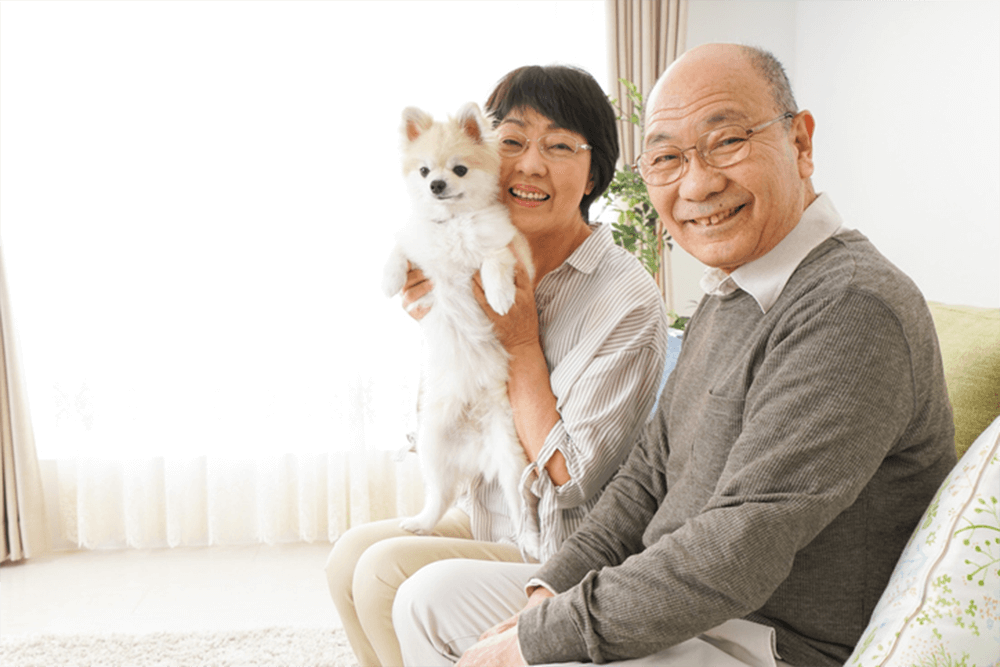According to the American Veterinary Medical Association, there were about 77 million pet dogs in the U.S. in 2018. It’s no wonder. Dog ownership — especially for seniors — has surprising benefits.
Studies suggest that having a dog reduces anxiety and lowers blood pressure. Scientists also say that dog ownership encourages exercise, boosts brain power, and triggers “happiness” hormones that stave off depression.
Companionship and socialization are vital as people age, and dogs provide both. Retirees who have lots of time and attention to offer find that small dogs are ideal for their golden years.
Ten small breeds to consider
Depending on whom you ask, the maximum weight for small dogs is between 22 and 30 lbs. In some breeds, males are slightly heavier than females. To get you started, check out these 10 popular breeds:
- Bichon Frise
Weight: 12-18 lbs
With their fluffy white coats and big brown eyes, these adorable dogs almost look like stuffed animals. They are easy to train and love going along on errands and social outings. Their hypoallergenic coat is another big plus.
- French Bulldog (or Frenchie)
Up to 28 lbs
This is one of the ultimate companion breeds. Whether they’re playing outdoors with grandkids or sprawling on the sofa for movie nights, Frenchies thrive on love and affection. They also tend to be “class clown” types that will do anything for a laugh.
- Havanese
7-13 lbs
This is a popular breed in therapy dogs. Havanese are smart, outgoing pets that don’t need a lot of exercise or living space. However, they expect tons of attention. The long, pretty coat needs frequent brushing.
- Japanese Chin (or Japanese Spaniel)
7-11 lbs
These dogs might have originated in Japan, China or the Korean Peninsula. In any case, they were bred to sit quietly in the laps of their royal masters and not cause any trouble. This might be the ideal choice for anyone who isn’t up to strenuous exercise. Japanese chins do require special grooming around their oversized eyes.
- Maltese
Up to 7 lbs
These tiny lap dogs are famous for their gentleness. Like the Havanese, they make good therapy dogs. Short daily walks are adequate for exercise. Owners love their non-shedding coat. However, a Maltese needs frequent brushing and bathing.
- Miniature Schnauzer
11-20 lbs
Mini schnauzers are known for their curiosity and intelligence. Indeed, with their long beards, they just look smart. Schnauzers like having something to do, and many bark out of boredom. The neighbors might complain if you leave one in the yard for long stretches. That said, mini schnauzers are great family dogs and highly alert watchdogs. An additional perk is that they were bred to chase vermin.
- Pomeranian
3-7 lbs
Poms are famous for the elegant fur collar framing their faces. Extreme loyalty to their owners is another favorite feature. They are playful and energetic but can be feisty if they’re not trained. Because of their tiny size, they must be watched for underfoot and handled with care. Like mini schnauzers, Pomeranians can be quite vocal.
- Poodle
Toy, 4-6 lbs; Mini, 10-15 lbs
What’s not to like about poodles? They’re one of the smartest breeds. They’re easy to train, obedient, well-mannered with strangers, and loyal. In families or with couples, poodles don’t play favorites the way some dogs do. They thrive with exercise, and monthly grooming maintains their good looks.
- Pug
14-18 lbs
Homebodies are crazy about easy going pugs. Since these dogs don’t breathe well in extreme heat or cold, light indoor exercise is fine when the weather is uncomfortable. Pugs are loyal, eager to please and a little more serious than other toy breeds. That’s not to say that they don’t have a playful, mischievous side. Expect heavy shedding, though, and keep the folds near the dog’s eyes clean.
- Shih Tzu
9-16 lbs
Shih tzus hail from Tibet, and the name means “little lion.” That’s not very accurate. These lap dogs were bred to love unconditionally, and they would rather cuddle than hunt any day. In fact, they tend to follow their owners from room to room. Barking isn’t a problem, but snoring might be.
As you can see, all breeds have their selling points and downsides. When choosing a dog, consider its health, grooming, exercise, and training needs. Dogs with special needs, for instance, require more frequent visits to the vet. Expected lifespan is another consideration.
Think about your lifestyle. Do you have the patience to train a willful dog or the energy to exercise an especially active one? Can you tolerate barking? The perfect companion is out there. Just do your homework and ask around.
At Meadow Lakes, pets are part of our families. There are waste bins, water bowls and even treats throughout our pet-friendly Life Plan Community in East Windsor, NJ! Schedule a visit to find out more.



